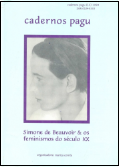Resumo
Él proposito del trabajo es hacer una comparación entre los procesos de construcción de la identidad de género de las mujeres de las minorías estadounidenses. Se intenta mostrar las diferencias entre la constitución y desarrollo de las organizaciones de las mujeres de las minorías chicanas y
negras con las organizaciones de lucha y objetivos de las organizaciones de las mujeres blancas de clase media. El trabajo es descriptivo en parte de los comienzos del feminismo blanco y de las mujeres de las minorías pero al mismo tiempo trata de elucidar la peculiar situación de las mujeres de color. Estas tienen, como las revolucionarias marxistas de los países del tercer mundo, el dilema de las prioridades de la patria-pueblo-raza y la identidad de genero. Negociaciones implícitas y explicitas toman cuenta de esta situación de ambivalencia.
Abstract
The purpose of this article is to compare the process of gender identity construction of the American women. Anglo women are compared with blacks and Chicanas in an attempt to show the differences between the objectives and organizations of anglo and middle class women and the objectives and organizations of minority women. The paper is descriptive of the starting of the movements trying, however to elucidate the peculiar situation of women of color (chicanas and blacks) in their connection with their priorities of pueblo-race (raza) and gender identity. There is not a single solution to these. Negotiations, both explicit and inexplicit, would take care of this ambiguous situation.
Referências
ANDERSEN, Margaret L. Thinking About Women: Sociological and Feminist Perspectives. 3 ed, New York, Macmillan, 1993.
CALDERON, Roberto and ZAMORA, Emilio. Manuela Solis Sager and Emma Tenayuca: “A Tribute”. In: Chicano Voices: Intersection of Class, Race, and Gender. National Association for Chicago Studies, Albuquerque, University of New Mexico Press, 1993.
CASTRO, Mary Garcia. Intolerâncias, Estranhamentos e Identidades. Ser Estrangeiro, Ser Estrangeira. Notas para Pesquisas Politicas de Identidades na Politica Latinos, Latinas nos
EEUU, I Simposio Internacional sobre a Emigração Brasileira, Casa do Brasil de Lisboa, Consulado Geral do Brasil em Lisboa e Centro de Estudos de Migrações Internacionais/ Universidade de Campinas, Lisboa 22 a 25 de Outubro de 1997.
CLARK, Septima P. and BROWN, Cynthia Stokes. Ready from Within: Septima Clark and the Civil Rights Movement. Navarro, California, Wild three Press, 1986.
COLLINS, Patricia Hill. Black Feminist Thought, Knowledge, Consciousness and the Politics of Empowerment: Perspectives on Gender. Volume 2, Boston, Unwin Hyman, 1990.
EVANS, Sara. Born for Liberty: A History of Women in America. New York, Free Press, 1989.
EVANS, Sara. Personal Politics, The Roots of Women’s Liberation in the Civil Rights Movement and the New Left. New York, Vintage Books, 1980.
FLORES, Francesca. Conference of Mexican Women in Houston. Regeneration 1: 1-4, 1971.
FRIEDAN, Betty. The Feminine Mystique. New York, Dell., 1983.
GRISWOLD DEL CASTILLO, Richard. La Familia: Chicago Families in the Urban Southwest 1848 to the Present. Notre Dame, Ind., Universty of Notre Dame Press, 1984
HERNANDEZ-GUITERREZ, M. El Colonialismo interno en la Narrativa Chicana. Tempe, Arizona, Bilingual Press/Editorial Bilingue, 1994 - citado em CORDOVA, Teresa. Foreword. In: Chicana Voices: Intersections of Class, Race, and Gender. Albuquerque, University of New Mexico Press, 1993.
HOLE, Judithy and LEVINE, Ellen. The First Feminist. In: FREEMAN, Jo. (ed.) Women: A Feminist Perspective. 3 ed., Palo Alto, California, Mayfield Publishing Company, 1984
LINDEN-WARD, Blanche and GREEN, Carol Hund. American Women in the 1960’s: Changing the Future. New York, Twayne Publishers, 1993.
MARTINEZ, Alice I. La identidad Feminina: Crisis y Construcción. In: TARRES, Maria Luisa. (compiladora) La Voluntad de Ser Mujeres en los Noventa. El Colegio de Mexico, Mexico, 1997.
MIRANDÉ, A. e ENRÍQUEZ, E. La Chicana. Chicago, The University of Chicago Press, 1979
GARCÍA, Alma. The Development of Chicana Feminist Discourse 1970-1980. In: LOPEZ, Antoinnette Sedillo. (ed.) Latinos in the United State. Vol. 2 - Latina Issues: Fragments of Historia, New York, Garland, 1995.
OROZCO, Cynthia. Sexism in Chicano Studies and the Community. In: Chicana Voices: Intersection of Class, Race and Genderf. National Association for Chicago Studies, Albuquerque, University of New Mexico Press, 1993.
OTERA, Marta. Mexicana Feminist. Magazin 1:30-32, 1973
SCHMUKLER, Beatriz. Las Madres com Compañero Viviente. In: SCHMUKLER, B. y DI MARCO, Graciela. (orgs.) Madres y Democratización de la Familia en la Argentina Contemporánea. Buenos Aires, Editorial Biblios, Biblioteca de las Mujeres, 1997.
SOLOMON, Irvin D. Feminism and Black Activism in Contemporary America: An Ideological Assessment. Women’s Studies, nº 106, New York, Greenwood Press, 1989.
STANDLEY, Anne. The Role of Black Women in the Civil Rights Movement. In: CRAWFORD, Vick L.; ROUSE, Jacqueline Anne and WOOD, Barbara. (eds.) Women in the Civil Rights Movement: Trailblazers and Torchbearers. Brooklin, N.Y., Carlson Publishing, Inc., 1990.
VASQUEZ, Richard. Chicano. New York, Doubleday 1971.

